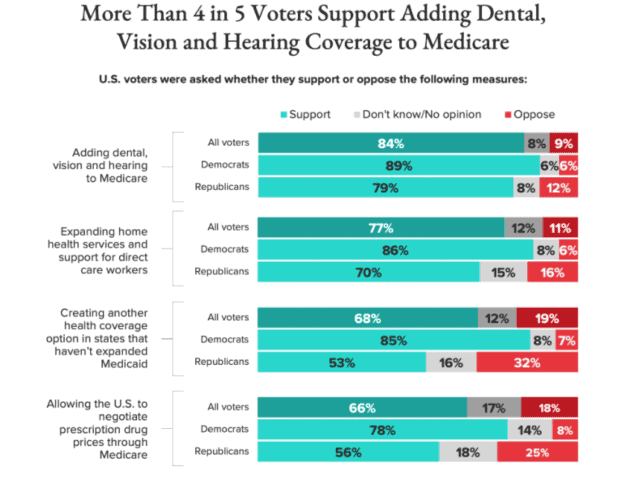
***This is an update of a previous Entitled to Know blog post.***
For years, we have been advocating for the expansion of seniors’ Medicare benefits. Traditional Medicare doesn’t cover basic dental, hearing, or vision care – which are the gateways to good health. Many seniors on fixed incomes simply can’t afford this kind of care on their own, so they skip visits to the eye doctor, the audiologist, or the dentist. We and other seniors’ advocates cheered President Biden’s Build Back Better plan, which called for adding dental, vision, and hearing coverage to Medicare. That plan is having a difficult birth in Congress, as moderate and Progressive Democrats wrangle over the plan’s size and scope, in anticipation of passing it via the budget reconciliation process.
Democratic leadership has set its sights on a possible vote on the package by the end of October, but some Hill-watchers believe that may be an overly optimistic target – as the party’s factions seem no closer to agreement than they were a few weeks ago. Meanwhile, seniors and their advocates anxiously await the outcome – hoping that long sought-after Medicare expansions will finally be enacted – and knowing that there is a limited window of opportunity to get it done, given that Democrats may lose control of one or both houses of Congress in 2022.
Policy analysts say that the most endangered of the potential new benefits is dental care, because it likely would be the most costly of the putative Medicare expansions – and would take the longest to get up and running. Dental coverage also faces dogged opposition from the American Dental Association (ADA), which is lobbying hard against it. Some Democrats have proposed dental vouchers as a compromise measure that could be activated much more quickly than a full-out dental benefit. But seniors’ advocates are wary of vouchers, because dentists could simply increase their prices significantly above the value of the vouchers, negating any serious net out-of-pocket savings for patients. Vouchers are also regarded as a big step toward privatization of Medicare, which advocates and the majority of the public rightly oppose. The ADA (and some Democrats) have even proposed the wrong-headed idea of means-testing any new benefits – so that only the poorest of beneficiaries would be eligible.
These roadblocks to Medicare expansion could have grave real-life consequences. Forgoing dental, vision, and hearing care increases seniors’ risk of serious injury and other health issues, which endangers beneficiaries and costs Medicare even more in the long run.
One thing is clear: the public wants Medicare expanded. According to a new Morning Consult poll, 84% of voters support adding dental, vision and hearing coverage to traditional Medicare. That number includes 79% percent of Republicans. Clearly, there is immense bipartisan support among everyday Americans for giving seniors these crucial coverages.

Morning Consult poll
Originally, Democrats wanted to pay for expanding Medicare with savings achieved through prescription drug pricing reform. The House-passed Elijah Cummings Lower Drug Costs Now Act (H.R.3) would save Medicare some $450 billion over ten years, mainly by allowing the program to negotiate prices directly with Big Pharma. But Democratic centrists in both chambers have balked at Medicare price negotiation, leaving the fate of the measure uncertain. Analysts say that a compromise negotiation measure may emerge, but that it could have less impact on actual drug prices.
On this issue, the public has made its preferences crystal clear. Poll indicates that a majority of voters across party lines support Medicare drug price negotiations. Republicans in Congress have called this commonsense proposal “Socialism,” even though the V.A. has been negotiating prices with drug-makers for years – and realizing significant savings in the process. According to one analysis, Medicare could save some 40% in drug costs if it were allowed to negotiate as the V.A. does. Of course, Big Pharma has launched an expensive lobbying effort and ad blitz against Medicare negotiation.
If drug pricing legislation is weakened in the budget reconciliation process, there will be less savings to the Medicare program. According to Adcock, that may limit the scope of dental, hearing, and vision coverage that can be added to Medicare. In fact, one or more of those coverages may not make it into the final legislation if there aren’t sufficient Medicare savings to pay for them.
“It’s possible we will see Medicare expansion enacted by the end of the year. It depends on how the Democrats are able to finesse this process. I wouldn’t bet the farm on it, but there’s a decent chance we’ll get something.” – Dan Adcock, NCPSSM Director of Government Relations and Policy
Seniors and their advocates will be understandably frustrated and disappointed if this historic opportunity to expand Medicare and tame Big Pharma price increases slips away because of intra-party conflicts. Voters delivered the White House and the House and Senate to Democrats in 2020, but left the party with slim majorities leaving little room for defections. As one analyst puts it, “Trying to do transformational change with a razor thin majority was going to be a daunting task in the first place. It’s going to remain an uphill slog.” We hope that Congress will keep slogging until seniors receive the coverage expansions they need to stay healthy — and some sorely-needed relief from soaring drug prices.


